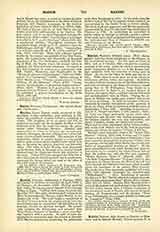

Martiall (or MARSHALL), JOHN, b. in Worcestershire, 1534, d. at Lille, April 3, 1597. He was one of the six companions associated with Dr. Allen in the foundation of the English College at Douai in 1568. He received his education at Winchester (1545-49) and New College, Oxford (1549-56), at which latter place, after a residence of seven years, he graduated as bachelor of civil law in 1556. He next accepted a post as assistant master at his old school at Winchester under Thomas Hyde; but soon after the accession of Elizabeth, both of them found it necessary to quit the country. Marshall retired to Louvain, where a number of English Catholic exiles were residing. Thence he removed to Douai, when he joined the new university recently founded there, and graduated B.D. in 1567. Thus it came about that when Allen arrived to found his new college, Marshall was already in residence, and willingly attached himself to the new foundation, which was destined to play so important a part in English Catholic affairs in the future. He did not, however, remain long, chiefly because of the smallness of the allowance which it was possible to give; later on, he obtained a canonry in the church of St. Peter at the neighboring city of Lille. Owing to the disturbed state of the country, he was not installed until 1579. He lived to enjoy his dignity for eighteen years. It was during his residence at Louvain that he brought out the two chief literary works for which he is known. The first of these, “Treatise of the Cross” (Antwerp, 1564), was a defense of the honor paid by Catholics to the Cross, and he dedicated it to Queen Elizabeth, being “emboldened upon her keeping the image of a crucifix in her chapel”. He was attacked by James Calfhill, the Calvinist, which brought forth his “Reply” (Louvain, 1566). He also wrote a treatise on the “Tonsure of Clerks”, which is still in MS.
BERNARD WARD

